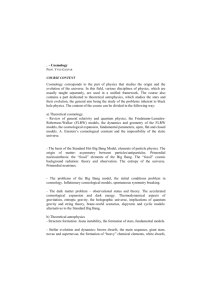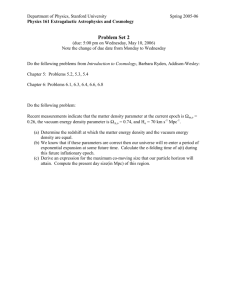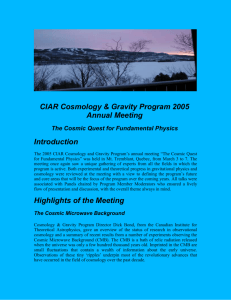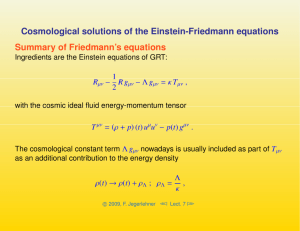Physics 444 Introduction to Cosmology
advertisement
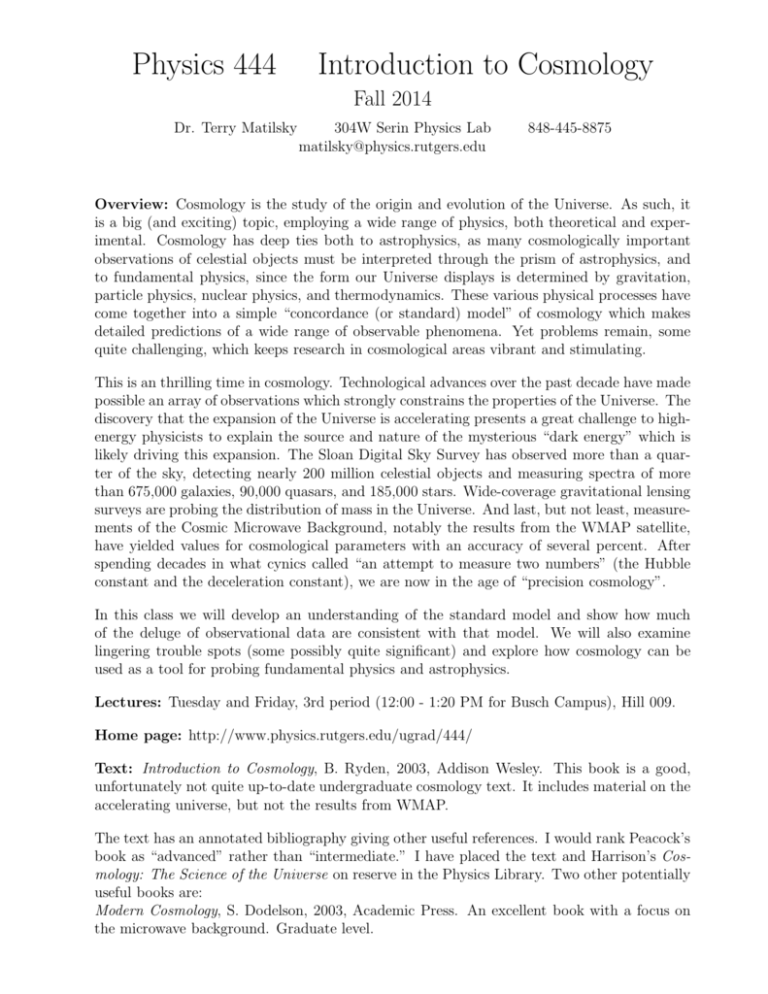
Physics 444 Introduction to Cosmology Fall 2014 Dr. Terry Matilsky 304W Serin Physics Lab matilsky@physics.rutgers.edu 848-445-8875 Overview: Cosmology is the study of the origin and evolution of the Universe. As such, it is a big (and exciting) topic, employing a wide range of physics, both theoretical and experimental. Cosmology has deep ties both to astrophysics, as many cosmologically important observations of celestial objects must be interpreted through the prism of astrophysics, and to fundamental physics, since the form our Universe displays is determined by gravitation, particle physics, nuclear physics, and thermodynamics. These various physical processes have come together into a simple “concordance (or standard) model” of cosmology which makes detailed predictions of a wide range of observable phenomena. Yet problems remain, some quite challenging, which keeps research in cosmological areas vibrant and stimulating. This is an thrilling time in cosmology. Technological advances over the past decade have made possible an array of observations which strongly constrains the properties of the Universe. The discovery that the expansion of the Universe is accelerating presents a great challenge to highenergy physicists to explain the source and nature of the mysterious “dark energy” which is likely driving this expansion. The Sloan Digital Sky Survey has observed more than a quarter of the sky, detecting nearly 200 million celestial objects and measuring spectra of more than 675,000 galaxies, 90,000 quasars, and 185,000 stars. Wide-coverage gravitational lensing surveys are probing the distribution of mass in the Universe. And last, but not least, measurements of the Cosmic Microwave Background, notably the results from the WMAP satellite, have yielded values for cosmological parameters with an accuracy of several percent. After spending decades in what cynics called “an attempt to measure two numbers” (the Hubble constant and the deceleration constant), we are now in the age of “precision cosmology”. In this class we will develop an understanding of the standard model and show how much of the deluge of observational data are consistent with that model. We will also examine lingering trouble spots (some possibly quite significant) and explore how cosmology can be used as a tool for probing fundamental physics and astrophysics. Lectures: Tuesday and Friday, 3rd period (12:00 - 1:20 PM for Busch Campus), Hill 009. Home page: http://www.physics.rutgers.edu/ugrad/444/ Text: Introduction to Cosmology, B. Ryden, 2003, Addison Wesley. This book is a good, unfortunately not quite up-to-date undergraduate cosmology text. It includes material on the accelerating universe, but not the results from WMAP. The text has an annotated bibliography giving other useful references. I would rank Peacock’s book as “advanced” rather than “intermediate.” I have placed the text and Harrison’s Cosmology: The Science of the Universe on reserve in the Physics Library. Two other potentially useful books are: Modern Cosmology, S. Dodelson, 2003, Academic Press. An excellent book with a focus on the microwave background. Graduate level. First Principles of Cosmology, E. V. Linder, 1997, Prentice Hall. Is a nice, concise undergraduatelevel overview of some major areas of cosmology, with an emphasis on nucleosynthesis, the microwave background, and large-scale structure. Office hours: Wednesday: 3:30 - 4:30 Also feel free to contact me by email or phone to set up a time to drop by my office. Homework and Grades: Your grade will be based on about seven problems sets (70%) and about two larger numerical assignments (30%). The problem sets will be handed out one week and due the next. You will have more time for the larger assignments. Sets handed in after I have posted solutions cannot receive credit. Students with Disabilities: If you have a disability, you are urged to speak to me early in the semester to make the necessary arrangements to support a successful learning experience. Students with disabilities should consult the webpage: http://www.physics.rutgers.edu/ugrad/disabilities.html. Class Calendar: Date Tu Sept 2 Fr Sept 5 Tu Sept 9 Fr Sept 12 Tu Sept 16 Fr Sept 19 Tu Sept 23 Fr Sept 26 Tu Sept 30 Fr Oct 3 Tu Oct 7 Fr Oct 10 Tu Oct 14 Fr Oct 17 Tu Oct 21 Fr Oct 24 Tu Oct 28 Fr Oct 31 Tu Nov 4 Fr Nov 7 Tu Nov 11 Fr Nov 14 Tu Nov 18 Fr Nov 21 Tu Nov 25 We Nov 26 Fr Nov 28 Tu Dec 2 Fr Dec 5 Tu Dec 9 Topic Introduction to Cosmology Fundamental Observations ′′ ′′ Gravity and Curvature ′′ ′′ Cosmic Dynamics ′′ ′′ Dynamics and Simple Universes Single-Component Universes Single- and Multiple-Component Universes Multiple-Component Universes NO CLASS . . . and the Benchmark Model Measuring Cosmological Parameters ′′ ′′ ′′ ′′ Dark Matter ′′ ′′ Cosmic Microwave Background ′′ ′′ ′′ ′′ Nucleosynthesis Nucleosynthesis and Baryogenesis Inflation and the Very Early Universe No Class CHANGE IN CLASS DAY Inflation and the Very Early Universe No Class (Thanksgiving) Formation of Structure ′′ ′′ ′′ ′′ Chap 1 2 2 3 3 4 4 4&5 5 5&6 6 6 7 7 7 8 8 9 9 9 10 10 11 11 12 12 12


